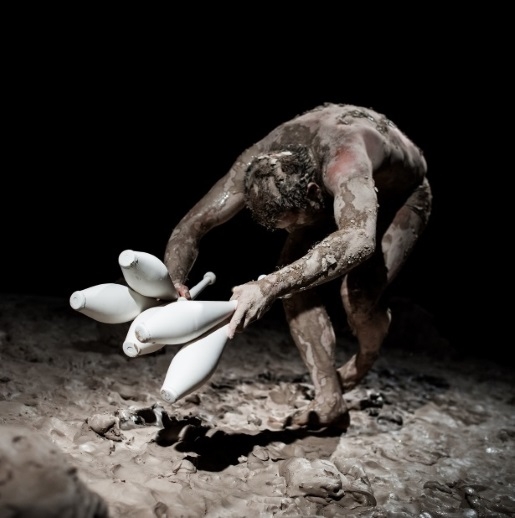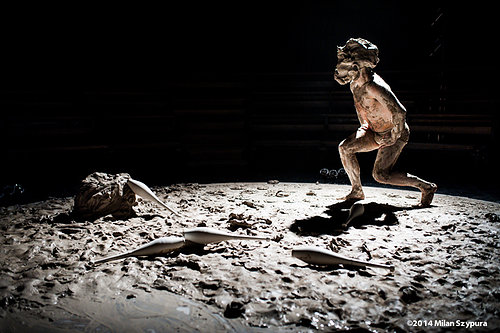Wickham Theatre, Circus City Festival, Bristol; 16th October 2015

The studio stage of the little Wickham Theatre has been transformed into an intimate ring marked with soft clay, not sawdust. For an engrossing hour that feels set out of time, Nathan Israël inhabits this universe as the ‘man of mud’ from the title – but the prosody of the English translation doesn’t sit as accurately as the lyrical French. This is a show of sensuous experience, revelling in the tactile qualities of the clay material as Israël pummels, tears, squishes and smoothes the malleable earth, dancing his own creation in a pre-lingual time-lapse of primal growth.
Before the show begins, we are handed a poem by Claude Louis-Combet to read (both the original French and in English translation). I usually try to avoid reading any programme notes before a show starts – I like to experience a work on my own terms before colouring my impressions with the intent of others – but this feels like a different proposition. What it evokes for me is an existence before the birth of language.
The show brings to mind a kaleidoscope of creation myths in itself; I see the Biblical Genesis, I see Jewish golums. I see stages of Freudian psyche development and a man creating his own identity – birth and fabrication. I see the evolving preoccupations of the circus form.
Would I have seen the same imagery in the show without the conditioning of the poem? I will never be able to discover. If this prior reading was an essential part of the show, I wonder if it could have been incorporated better within the structure of the production experience.

The white plastic juggling clubs do not fit within the tangible earthiness of the general aesthetic and so, existing outside of that world, become symbolic when they are used. Without language, they become that impulse, that spark of being human, that strives always for more understanding and more control in a confusing and mysterious universe.
Vincent Maire‘s lighting appears from above and below, enforcing the textural qualities of Israël’s clay covered form and casting everything with the inviting warmth of primordial fires; the thuds, splashes, squelches and slaps of flesh and clay are set against a soundtrack from Théo Girard. Beginning and ending with simple rhythmic pulses, which Israël matches with the catches of his clubs, it grows through a variety of stringed forms, and incorporates the whispered text of Louis-Combet’s poem in the female voice of director Luna Rousseau.
Without language, the only communication that can occur is through the loose associations our senses can provide. The slippery images and sounds of L’Homme De Boue convey plenty and, based within our own personal circumstances and experience, we are left to unravel their meaning individually.
.





[…] supporting programme information we’re provided with before the show sits, for the second time this week, frustratingly between being an integral part of the overall experience and being merely […]